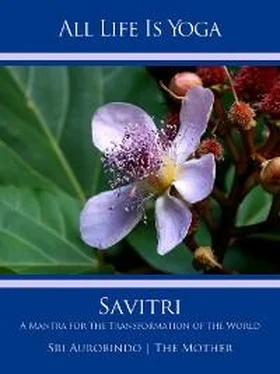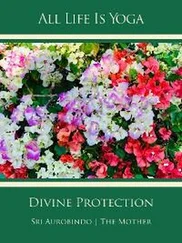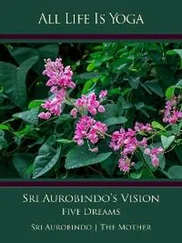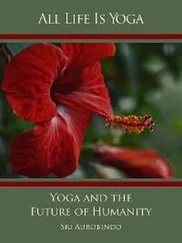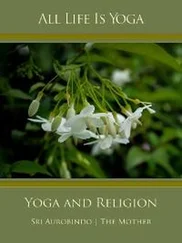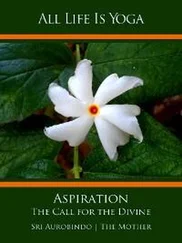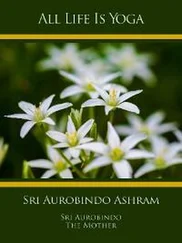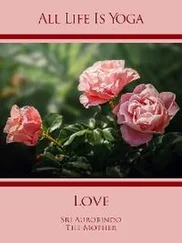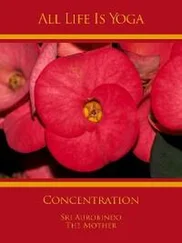Sri Aurobindo - All Life Is Yoga - Savitri
Здесь есть возможность читать онлайн «Sri Aurobindo - All Life Is Yoga - Savitri» — ознакомительный отрывок электронной книги совершенно бесплатно, а после прочтения отрывка купить полную версию. В некоторых случаях можно слушать аудио, скачать через торрент в формате fb2 и присутствует краткое содержание. Жанр: unrecognised, на английском языке. Описание произведения, (предисловие) а так же отзывы посетителей доступны на портале библиотеки ЛибКат.
- Название:All Life Is Yoga: Savitri
- Автор:
- Жанр:
- Год:неизвестен
- ISBN:нет данных
- Рейтинг книги:3 / 5. Голосов: 1
-
Избранное:Добавить в избранное
- Отзывы:
-
Ваша оценка:
- 60
- 1
- 2
- 3
- 4
- 5
All Life Is Yoga: Savitri: краткое содержание, описание и аннотация
Предлагаем к чтению аннотацию, описание, краткое содержание или предисловие (зависит от того, что написал сам автор книги «All Life Is Yoga: Savitri»). Если вы не нашли необходимую информацию о книге — напишите в комментариях, мы постараемся отыскать её.
All Life Is Yoga: Savitri — читать онлайн ознакомительный отрывок
Ниже представлен текст книги, разбитый по страницам. Система сохранения места последней прочитанной страницы, позволяет с удобством читать онлайн бесплатно книгу «All Life Is Yoga: Savitri», без необходимости каждый раз заново искать на чём Вы остановились. Поставьте закладку, и сможете в любой момент перейти на страницу, на которой закончили чтение.
Интервал:
Закладка:
*
...it is well to insist that the native power of poetry is in its sight, not in its intellectual thought-matter, and its safety is in adhering to this native principle of vision; its conception, its thought, its emotion, its presentation, its structure must rise out of that or else rise into it before it takes its finished form. The poetic vision of things is not a criticism of life, not an intellectual or philosophic view of it, but a soul-view, a seizing by the inner sense. The Mantra too is not in its substance or its form a poetic enunciation of philosophic verities, but a rhythmic revelation or intuition arising out of the soul’s sight of God and Nature and itself and of the world and of the inner truth – occult to the outward eye – of all that peoples it, the secrets of their life and being.
*
...one poet may seem to excel in the concrete presentation of things and falter or be less sure in his grasp of the purely subjective, while another may move freely in the more subjective worlds and be less at home in the concrete; and both may be poets of a high order. But when we look closer, we see that just as a certain objectivity is necessary to make poetry live and the thing seen stand out before our eyes, so on the other hand even the most objective presentation starts from an inner view and subjective process of creation or at least a personal interpretation and transmutation of the thing seen. The poet really creates out of himself and not out of what he sees outwardly: that outward seeing only serves to excite the inner vision to its work. Otherwise his work would be a mechanical construction and putting together, not a living creation.
*
From our present point of view we may say that the poet may do as he pleases in all that is not the essential matter. Thought-matter may be prominent in his work or life-substance predominate. He may proceed by sheer force of presentation or by direct power of interpretation. He may make this world his text, or wander into regions beyond, or soar straight into the pure empyrean of the infinite. To arrive at the Mantra he may start from the colour of a rose, or the power or beauty of a character, or the splendour of an action, or go away from all these into his own secret soul and its most hidden movements. The one thing needful is that he should be able to go beyond the word or image he uses or the form of the thing he sees, not be limited by them, but get into the light of that which they have the power to reveal and flood them with it until they overflow with its suggestions or seem even to lose themselves and disappear into the revelation and the apocalypse. At the highest he himself disappears into sight; the personality of the seer is lost in the eternity of the vision, and the Spirit of all seems alone to be there speaking out sovereignly its own secrets.
*
...it is not sufficient for poetry to attain high intensities of word and rhythm; it must have, to fill them, an answering intensity of vision and always new and more and more uplifted or inward ranges of experience. And this does not depend only on the individual power of vision of the poet, but on the mind of his age and country, its level of thought and experience, the adequacy of its symbols, the depth of its spiritual attainment. A lesser poet in a greater age may give us occasionally things which exceed in this kind the work of less favoured immortals. The religious poetry of the later Indian tongues has for us fervours of poetic revelation which in the great classics are absent, even though no mediaeval poet can rank in power with Valmiki and Kalidasa. The modern literatures of Europe commonly fall short of the Greek perfection of harmony and form, but they give us what the greatest Greek poets had not and could not have. And in our own days a poet of secondary power in his moments of inspiration can get to a vision far more satisfying to the deepest soul within us than Shakespeare’s or Dante’s. Greatest of all is the promise of the age that is coming, if the race fulfils its highest and largest opening possibilities and does not founder in a vitalistic bog or remain tied in the materialistic paddock; for it will be an age in which all the worlds are beginning to withdraw their screens from man’s gaze and invite his experience, and he will be near to the revelation of the Spirit of which they are, as we choose, the obscuring veils, the significant forms and symbols or else the transparent raiment. It is as yet uncertain to which of these consummations destiny is leading us.
* * *
1The Sanskrit word for poet. In classical Sanskrit it is applied to any maker of verse or even of prose, but in the Vedic it meant the poet-seer who saw the Truth and found in a subtle truth-hearing the inspired word of his vision.
Chapter 3
The Poetry of the Future
Words of Sri Aurobindo
The poetry of the future has to solve, if the suggestions I have made are sound, a problem new to the art of poetic speech, an utterance of the deepest soul of man and of the universal spirit in things, not only with another and a more complete vision, but in the very inmost language of the self-experience of the soul and the sight of the spiritual mind. The attempt to speak in poetry the inmost things of the spirit or to use a psychical and spiritual seeing other than that of the more outward imagination and intelligence has indeed been made before, but for the most part and except in rare moments of an unusually inspired speech it has used some kind of figure or symbol more than a direct language of inmost experience; or else, where it has used such a language, it has been within the limited province of a purely inward experience as in the lofty philosophic and spiritual poetry of the Upanishads, the expression of a peculiar psychic feeling of Nature common in far eastern poets or the poetic setting of mystic states or of an especial religious emotion and experience of which we have a few examples in Europe and many in the literature of western Asia and India. It is a different and much larger creative and interpretative movement that we now see in its first stages, an expansion of the inner way of vision to outer no less than to inner things, to all that is subjective to us and all that is objective, a seeing by a closer identity in the self of man with the self of things and life and Nature and of all that meets him in the universe. The poet has to find the language of these identities, and even symbol and figure, when brought in to assist the more direct utterance, must be used in a different fashion, less as a veil, more as a real correspondence.
The first condition of the complete emergence of this new poetic inspiration and this vaster and deeper significance of poetic speech must be the completion of an as yet only initial spiritualised turn of our general human feeling and intelligence. At present the human mind is occupied in passing the borders of two kingdoms. It is emerging out of a period of active and mostly materialistic intellectualism towards a primary intuitive seeking to which the straining of the intellect after truth has been brought in the very drive of its own impulse by a sort of slipping over unexpected borders. There is therefore an uncertain groping in many directions some of which are only valuable as a transitional effort and, if they could be the end and final movement, might land us only in a brilliant corruption and decadence. There is a vitalistic intuitivism sometimes taking a more subjective, sometimes a more objective form, that lingers amid dubious lights on the border and cannot get through its own rather thick and often violent lustres and colours to a finer and truer spiritual vision. There is an emotional and sensational psychical intuitivism half emerging from and half entangled in the vitalistic motive that has often a strange beauty and brilliance, sometimes stained with morbid hues, sometimes floating in a vague mist, sometimes – and this is a common tendency – strained to an exaggeration of half vital, half psychic motive. There is a purer and more delicate psychic intuition with a spiritual issue, that which has been brought by the Irish poets into English literature. The poetry of Whitman and his successors has been that of life, but of life broadened, raised and illumined by a strong intellectual intuition of the self of man and the large soul of humanity. And at the subtlest elevation of all that has yet been reached stands or rather wings and floats in a high intermediate region the poetry of Tagore, not in the complete spiritual light, but amid an air shot with its seekings and glimpses, a sight and cadence found in a psycho-spiritual heaven of subtle and delicate soul experience transmuting the earth tones by the touch of its radiance. The wide success and appeal of his poetry is indeed one of the most significant signs of the tendency of the mind of the age. At the same time one feels that none of these things are at all the whole of what we are seeking or the definite outcome and issue. That can only be assured when a supreme light of the spirit, a perfect joy and satisfaction of the subtlety and complexity of a finer psychic experience and a wide strength and amplitude of the life soul sure of the earth and open to the heavens have met, found each other and fused together in the sovereign unity of some great poetic discovery and utterance.
Читать дальшеИнтервал:
Закладка:
Похожие книги на «All Life Is Yoga: Savitri»
Представляем Вашему вниманию похожие книги на «All Life Is Yoga: Savitri» списком для выбора. Мы отобрали схожую по названию и смыслу литературу в надежде предоставить читателям больше вариантов отыскать новые, интересные, ещё непрочитанные произведения.
Обсуждение, отзывы о книге «All Life Is Yoga: Savitri» и просто собственные мнения читателей. Оставьте ваши комментарии, напишите, что Вы думаете о произведении, его смысле или главных героях. Укажите что конкретно понравилось, а что нет, и почему Вы так считаете.
